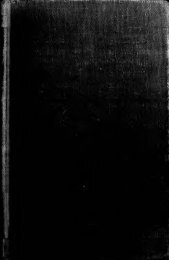Ecclesiastes - GA Barton - 1908.pdf
Ecclesiastes - GA Barton - 1908.pdf
Ecclesiastes - GA Barton - 1908.pdf
You also want an ePaper? Increase the reach of your titles
YUMPU automatically turns print PDFs into web optimized ePapers that Google loves.
48<br />
ECCLESIASTES<br />
conclusion to be drawn from them had been stated at the end of<br />
ch. 3. Ch. 4 13 - 16 sets forth the vanity or transient nature of popu-<br />
larity as exhibited in the history of two young unnamed kings.<br />
The statement suggests that the acme of human glory is even more<br />
vain than other forms of human activity.<br />
In ch. 5 1 - 7<br />
Qoheleth offers us his most extended remarks upon re-<br />
ligion. The two glosses (5" and 7j_) on dreams do not seriously<br />
interrupt the flow of his thought. He had in ch. 3 revealed his<br />
conception of God as a powerful being, who keeps man in ignorance<br />
(3 11 emended text), and who has circumscribed man in the inex-<br />
orable meshes of fate, so that man may fear him. Now Qoheleth<br />
goes on to counsel obedience, reverence, and a faithful performance<br />
of one's covenants with God. His conception of God is dark,<br />
but such religion as he has is sincere. Qoheleth has no tolerance<br />
for shams, nor sympathy with the glib worshipper who in a mo-<br />
ment of fright will covenant with God for anything, if only he may<br />
escape the impending danger, and then go his way and forget it<br />
when the danger is past. What in his view the real function of re-<br />
ligion was, he does not tell us, but he does insist that such religious<br />
practices as one engages in should be reverent and sincere.<br />
8 9<br />
In ch. 5 -6 Qoheleth returns again to the subject of oppression,<br />
which in every Oriental country, as in every despotism, is so pain-<br />
ful an element in life. He first observes that in a country ruled by<br />
a hierarchy of officers oppression is to be expected, though a king<br />
is on the whole an advantage, and then passes to the consideration<br />
of the various kinds of oppression which grow out of the love of<br />
money. In the course of this discussion he more than once 18<br />
(5<br />
19<br />
2 6 3<br />
) reiterates his theory, that the one ray of light on life is to eat<br />
and drink and gain what enjoyment one can, without wearing one's<br />
self out in useless labor. This is transient (vain, 6 9 but there is<br />
),<br />
nothing better.<br />
These thoughts lead Qoheleth in ch. 6 10 - 12 to revert to the theme<br />
1 - 14<br />
of ch. 3, the contrast between puny man and fate. In<br />
ch^ y Qoheleth<br />
introduced a few proverbs which enforced his point of view.<br />
These the Hokma glossator has considerably amplified with proverbs<br />
which have no bearing on the question in hand.<br />
Then, as though the indictment against the order of the world





